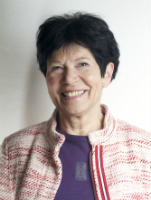Professor Helga Nowotny
Professor emerita of Social Studies of Science, ETH Zurich to give a Gifford Lecture on 'Beyond Innovation. Temporalities. Re-use. Emergence'

Beyond Innovation. Temporalities. Re-use. Emergence.
Event details
Date: Wednesday 13 May 2015, 5.30 - 7pm
Venue: Business School Auditorium and Concourse, 29 Buccleuch Place, Edinburgh, EH8 9JS
Biography
Helga Nowotny is Professor emerita of Social Studies of Science, ETH Zurich, and a founding member of the European Research Council.
In 2007 she was elected ERC Vice-President and from March 2010 until December 2013 President of the ERC. Recently, she has been appointed Chair of the ERA Council Forum Austria.
She holds a PhD in Sociology from Columbia University, NY and a doctorate in jurisprudence from the University of Vienna.
She has held teaching and research positions at the Institute for Advanced Study, Vienna; King’s College, Cambridge; University of Bielefeld; Wissenschaftskolleg zu Berlin; Ecole des Hautes Etudes an Sciences Sociales, Paris; Science Center for Social Sciences, Berlin; Collegium Budapest; Budapest.
Before joining ETH Zurich, Professor Nowotny was Professor for Social Studies of Science at the University of Vienna. Among her many awards and honours is the John Desmond Bernal Prize for life time achievements in Social Studies of Science.
Helga Nowotny is Foreign Member of the Royal Swedish Academy of Sciences and continues to serve on many international advisory boards throughout Europe. She received doctorates honoris causa from several European universities and a PhD honoris causa from the Weizmann Institute of Science, Israel. Helga Nowotny has published widely in social studies of science and technology and on social time.
Lecture abstract
The quest for innovation has become ubiquitous. It is high on the political agenda and raises hopes where few alternatives are in sight. It continues to be equated with the dynamics of wealth and even job creation and is hailed as solution to the major challenges facing our societies. Yet, as Schumpeter observed more than one hundred years ago, innovation is not only disruptive, but can also be destructive. It creates winners and losers and therefore remains a double-edged sword.
Despite the relentless pursuit of novelty which has become the hallmark of modern societies and their unprecedented preference for the new, there is no theory of innovation. The relationship between technological innovation, be it incremental or science-based, radical innovation, and the capacity of society to create the appropriate conditions and to absorb the outcome socially is far from being understood. Nor is it clear whether innovation can be directed and planned, and if so, to what extent.
Once we are ready to question the more narrow focus on innovation as a short-term goal, hidden temporalities of how the new is generated come into view. So do the multiple ways to re-use the past and what already exists through creative recombination. Finally, thinking beyond innovation as conceptualized today leads to the question of emergence as a phenomenon of complexity and a source of creativity.

